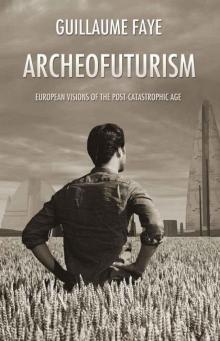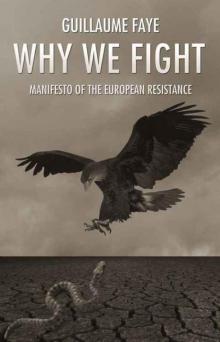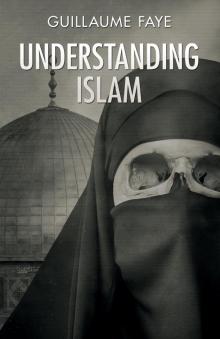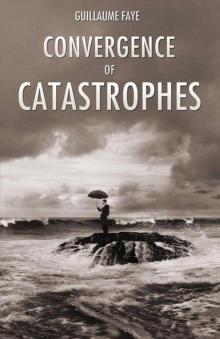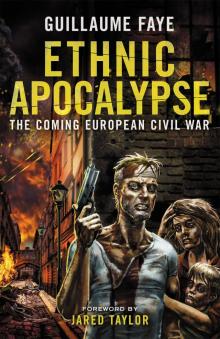Archeofuturism, page 21




It is a shame that many of those who claim to be ‘attached to France’, such as the Front National for instance, are not choosing the path of a European federal empire, but rather insist – out of nostalgia and romanticism, no doubt – to show micro-nationalist attachment towards the French state. These people fail to realise that the French state is intrinsically destructive for the ethnic identity of the French people, and that it cannot be changed in its essence, for it has proven incapable of protecting us from unrestrained immigration. Would a federal European state be more capable of doing so? I believe it would, provided it is exactly the opposite of the European state that is currently being built.
People and groups like the Front National are actually quite right to speak out against the Europe Union based on the Amsterdam Treaty, a bureaucratic and apolitical monster which contributes to unemployment with its free-market ultra-liberalism, encourages immigration through its pseudo-humanistic ideology and the utter porosity of its outer frontiers, is responsible for the desertification and environmental pillaging of the countryside, limits civil democracy with its pre-totalitarian technocratic tendencies (EU ‘directives’ would be worthy of the Gosplan),[187] and in all strategic and commercial matters yields to the diktats of its American overlords – for the EU is only an administrative organ with no sovereignty at all.
There is little doubt that, through the fool’s bargain of the EU, nation-states are foregoing their sovereignty and replacing it with a complete void – with ‘nothing’ at all: a legal dinosaur devoid of any political will and utterly incapable of defending us. Yet, the alternative to this is not a return to the states under siege that existed before the War, nor a Europe based on the ‘mutual understanding of nations’, as envisaged by Talleyrand.[188] The solution to help us defend ourselves must be a radical one: a ‘good’ federation (one I believe should be based on autonomous regions) capable of imposing itself as a genuine state and exercising a weighty influence on the international scene as a real world power. A federation of this kind could only emerge after a shock, once the pseudo-federation we have now has shown all its impotence and noxiousness.
I believe the right strategy would be to lead a revolution within the European Union, in such a way as to radically transform it – and not make a backward-looking return to the nation-states system, which in any case would be incapable of defending us. In history, only structural changes can reverse what exists and bring revolutions about – not circumstantial changes.
France – like Germany – is finished as a political entity. Europe must take its place. Like the late Middle Ages, ours is a difficult age of interregnum, albeit in an inverse sense. France will survive, but not as a legal entity: rather, as a culture in the Germanic sense of the term.
The only hope for salvation in this dark age of ours lies in the attempt to build a federation – the great federation Nineteenth century visionaries had foreseen: the United States of Europe. A federation of this kind would be capable of standing up to the American one, of creating a protected and self-centred continental economic space, and of curbing the rise of Islam and demographic colonisation from Africa and Asia. As history is gaining momentum, if Russia were to join us we could start working on the tremendous project of building Eurosiberia.
Despite all its defects, I believe the present European Union will be the prelude to a genuine federation, according to a dialectic process: for when catastrophe hits, the present Union, in its impotence, will have to undergo revolutionary change (this, and not any dangerous restoration of the nation-state model is the path we will have to pursue).
The slogan ‘An independent France within a strong Europe’ is a utopia and a contradiction in terms, for:
1) a strong Europe cannot be based on an agreement between twenty independent nations;
2) independent nations that will not agree to transfer their sovereignty cannot serve as the basis for a strong Europe;
3) a powerful Europe, in my view, cannot but derive from the federation of autonomous European regions, as the great differences in size between European nations prevents the building of any viable federal and political union (as shown by the current, stupid attempt to do so).
For this reason, we must approach the European Union of today with Machiavellian cynicism in order to subvert it from within. Alain de Benoist has made exactly the same analysis as me in promoting the idea of a European empire, rejecting the French Jacobin model, and denouncing the shortcomings of the bastard Union we have today. De Benoist has also explained why he voted in favour of the Maastricht Treaty (see La ligne de mire, II).[189] Europeans are perhaps in the process of clumsily laying the foundations for a new state or – to be more exact – a new empire. Like all great revolutions, this is taking place amid scribbles, not a flourish of trumpets. It is letting itself be led, to use Lenin’s expression, by useful idiots who are haunted – and this is a sign of the folk unconscious – by a badly formulated intuition (according to the logic of political suppression Pareto described): the development of a macro-continental defence strategy in the face of the increasing threat posed by outside peoples – the ‘giant hedgehog’ strategy.
Make no mistake: the present European Union is far from perfect, as are all great historical works in the making. Nothing takes place according to the visionary scenarios drawn by intellectuals, for ‘all art is suffering’ – as Nietzsche put it. But it is precisely because this Union is imperfect that we should jump on the historical bandwagon to correct it and pave the way for revolution.
Again, the dialectical passage from the impotent and oppressive European Union we have today to the federation I have envisaged could only take place through the mental shock engendered by catastrophe (it is worth bearing in mind that the radical change of spirits caused by the defeat of 1940 led to forms of political organisation that had previously been inconceivable). Quite simply, this appalling Union has the simple yet great merit of making the whole world reason in terms of Europe. It also has the advantage of assigning a greater significance to regions, the future bricks of a federal empire, which are connected to the kind of ethnic identity the cold and crisis-ridden states of today have lost.
An ideology is powerless unless it enters the arena of debate. If it limits itself to the idea of ‘France’ it will never have any political influence. The followers of Maurras made an ideological exit from history the moment they chose to attach themselves to the old notion of royalism. We must make sure not to make the same mistake by sticking to French nationalism, which is now obsolete. A new container is in the making: the European Union. Let us fill it with what we have. European nationalism is the way forward.
Not the Destruction of France,
but its Redefinition as ‘Gaul’
Is it not quite clear that the republican ideology of the French nation-state is incapable of defending the people of the Hexagon?[190] That French culture and language don’t need this state? And that we already have a political entity that has made the formidable decision to adopt a single currency and flag, and which is effectively a state in the making?
Alone in its isolation and accounting for only 0.9% of the world population, France cannot be protected or made dynamic. Already 40,000 Frenchmen have moved to Silicon Valley, near San Francisco, as expats, and have been replaced by as many illegal immigrants with no skills. As for the ‘Europe of nations’ model, which does not imply any transfer of sovereignty, it would only create an empty shell where the Americans – ‘the first European power’, as they themselves like to say – would play divide and conquer. In order to affirm ourselves and resist in the difficult century in the making with its vast world blocs, we need an empire, not a diplomatic association of small or medium pseudo-independent nations (which will never reach any mutual agreement) on the obsolete model of the Congress of Vienna of 1815.
Those who believe that an imperial and federal European state would ‘kill France’ are confusing the political sphere with the ethno-cultural one. Their notion of belonging is a mechanistic and static one. The disappearance of the Parisian state – to call it by its name – would in no way threaten the vigour and identity of the people of old Gaul. On the contrary, it would reinforce them.
To build a future federal (and imperial) European state, the statist French notion of the ‘jus soli’, inherited from the Revolution, must disappear. The simple reason for this is that the traditions of the British, Spanish, Germans, Slavs, etc. are closer to the right of blood, and so the French state will have to forego part of its universalising claims. Obstinate attachment to the French Jacobin state – be it from the Left or Right – means paving the way for automatic mass naturalisations. Those who are naturalised, rather than integrating, will never feel French, but will always continue to feel Arab or African. For they reason in ethnic terms.
Unfortunately, there is already talk in Germany today, under the influence of the French Left and out of chronic self-hatred and guilt, of adopting the law of ground. Yet from the point of view of a European federation, based on autonomous regions with traditional roots (and no longer mentally dependent upon the disembodied Jacobin ideology and the idea of cosmopolitanism sprung from the French Revolution), places like Bavaria, the Palatinate, Burgundy or Occitania will have returned to ethnic entities and will thus find it easier to do away with the present taboos surrounding the right of blood, a right which they would include in their legislations.
The passage to a federal state would not destroy the physical substance of France, but rather reinforce it. How? By breathing new life into autonomous regions: Brittany, Normandy, Provence, etc., which would rediscover their individual personalities within a common European home. Within a federal Europe, France would return to be what it is, deep down: Gaul.
For a Democratic and
Federal European Nationalism
We must abandon French nationalism along with the shady pseudo-Europeanism of the Brussels Commission[191] and play the card of a third way, European nationalism, in the framework of EU institutions. We must do so with intelligence and by avoiding manifest extremism. How can it be normal for those who have always dreamt of a great Europe to balk at boarding the plane when it is about to take off? Even if they don’t like the pilots, shouldn’t they have the courage to play the pirates of the air?
I would now like to examine a number of crucial points concerning the way we should shape this nationalist view of a future United States of Europe. Clearly, these are only outlines and suggestions. History shows that all revolutionary thought must be based on a set programme – as Caesar, Napoleon and Lenin knew well – until a collective shock occurs that, through the wavering and sinking of people’s spirits, will enable its implementation. The making and affirmation of new historical entities depends on the meeting of these two notions, which serve as the sperm and egg of history:
We must embrace a genuinely democratic – and no longer bureaucratic – European government with a real parliament and a strong and decisive central power.
We must do away with the national dimension, which is no longer viable (it is ridiculous, for instance, for the presidency of the EU to be assigned to Luxemburg after Germany), particularly now that plans have been made to extend the EU to central Europe. We must then establish autonomous regions or Länder,[192] according to an extended German model (Brittany, Bavaria, Scotland, etc.), where general agreement will determine the political will of each federal power and the president of the Union will be directly elected. Regional autonomy would reinforce the ethnic character of the Union, which is currently overshadowed in France by the ideology of the state. Ethno-regional identity is already gaining increasing importance across Europe (in the United Kingdom, Italy, France, Belgium, etc.). This is a ‘weighty historical tendency’, to use Fernand Braudel’s[193] expression. This form of regionalisation must be promoted, not in a vaguely romantic way, but by illustrating its technical institutional advantages. A Union composed of fifteen different states of variable sizes would not be easy to govern. It would be better off to have seventy Länder, each protecting its own autonomy and democratically representing the local population, and a de-bureaucratised central government – with Brussels as the capital and ‘federal district’ of the Union – that would be something more than the present rump-parliament in Strasbourg.
The United States of Europe, an organic assembly of large and highly autonomous regions (some of which would consist of present states, such as the Czech Republic and Ireland), would determine a new world geopolitics and accelerate the course of history. Only in this framework would it be possible for Europe to compete with the dollar, emancipate itself from NATO and negotiate with the United States on an equal footing. Considering human cowardliness, I believe that this order, structural revolution (secretly planned since the end of the European civil wars in 1945) and difficult birth of a new and internationally influential historic entity will profoundly change the outlook of the contemporary French people, who are currently victims of the whims of the Parisian state. We must trust history, which is synonymous with movement, change, and assault.
At the same time, it is necessary to envisage a radical redevelopment of the ‘Schengen Area’[194] of free inner circulation and consider adopting a ‘fortress logic’ for the Union.
The future regions must be granted large powers with respect to internal matters (cultural, linguistic, educational, etc.), as a return to regional identity on a European level would only contribute to our common strength. Different but united: for united we stand, divided we fall.
From an economic point of view, we must consider the prospect of establishing a semi-autarchic common European space. Global free trade is not viable. The united Europe of the future must terminate the GATT agreement[195] and adopt a moderate but effective form of continental protectionism. We are numerous enough not to have any vital need for foreign trade, which often also implies dangerous transfers of technology.
In the long term, we must think in Euro-strategic terms. Gorbachev had understood this well: ‘Ours is a common home,’ he noted.[196] From Brittany to Kamchatka, 25,000 kilometres lie between the shores of Groix and those of Kerinask; but the men are the same, the virtual citizens of a common empire, and ultimately members of the same folk: the European. We can accommodate guests, but not invaders. Gorbachev simply wished to express this intuition: that we are part of the same group of peoples; that we should stop waging war against each other (as in the Yugoslav Wars, the last foolish European war) and unite. Our linguistic differences are only details compared to our ethnographic commonalities. This is the Germanic approach to history as ethnic logic asserting itself against the utopia created by the French Revolution, which has nothing particularly ‘democratic’ about it (in the Greek sense of the word) but, on the contrary, is strikingly totalitarian.
We would do well to join Russia one day and envisage the future in terms of Eurosiberia. The unpleasant conditions Russia finds itself in today are only a transient and short-term problem. All we must do is counter the (natural and understandable) will of the United States to control Eurosiberia and lend Russia protection and financial assistance in view of its future strategic and economic reduction to subservience.
Eurosiberia
Celts, Germans, Greeks, Slavs, Scandinavians, Romans, Iberians... or, rather, we, the descendants of these peoples, must now see ourselves as part of the same folk and the inheritors of a common land – a vast motherland with colossal resources, both material and human, shaped by a common history. According to the less ambitious hypothesis, this land would stretch from the Atlantic to the Russian borders; according to the most ambitious one (which must always be promoted), it would be identified with Eurosiberia, which may also be taken as a paradigm for the idea of ‘Greater Europe’: a land stretching from Brest to the Bering Strait, twenty-four times the size of France. This would be the largest unified political entity in the history of mankind, one extending across fourteen time zones. ‘Politics is only for those capable of having a broad, very broad view of things’, as Nietzsche said.
One of our frontiers would be the Amur River – our border with China. Others would be the Atlantic and Pacific, our borders with the imperial American republic, the leading world superpower but one whose geostrategic and cultural decline has already been ‘virally’ programmed for the first quarter of the Twenty-first century – as foretold by Zbigniew Brezeziński (an apologist for American power nonetheless). Two other frontiers of ours would be the Mediterranean and the Caucasus, our borders with the Muslim block (which is less divided than is commonly thought). This block will give us no quarter and will probably represent our greatest threat; but at the same time, if we are strong enough, it may represent an excellent partner...
We, the descendents of related peoples, are being offered the chance to share a space that, already in our children’s lifetime, may come to embody what Charles V[197] dreamt about but was unable to preserve: ‘An empire on which the sun never sets.’ When it is noon in Brest it is 2 AM on the Bering Strait (and vice-versa). This is an ideal we can pursue, one of the few remaining ones in this age of pessimism: to build an empire of our own. What a haunting dream! Great plans are drawn not with pomp and solemnity, but in the silence of cabinets; and they are implemented by predators on their guard for a historical disaster to happen and make their prey emerge from the undergrowth in panic. The folk unconscious will always be the hardcore stuff upon which the plans of revolutionary leaders will rest.

